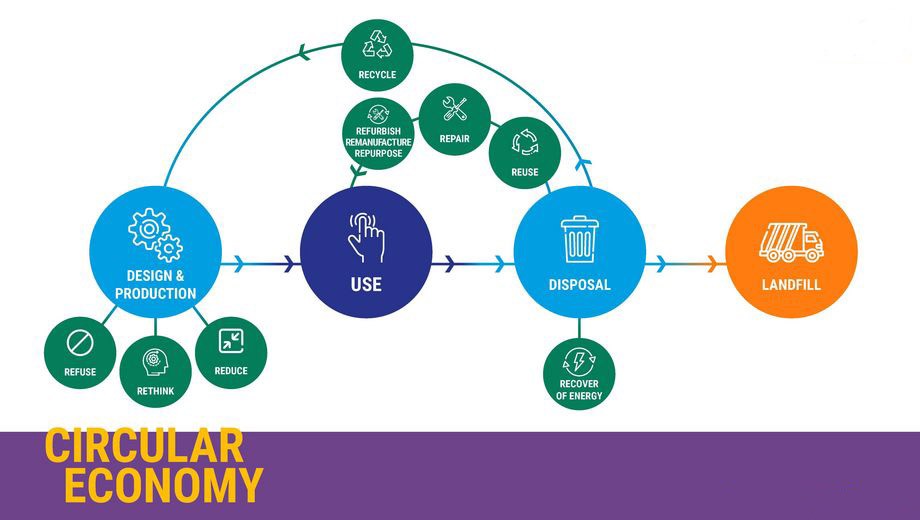In the last decade, as pollution concerns have come into sharper focus, more businesses and individuals have tried to shift their behavior towards supporting a more circular economy.
We hear more and more about the circular economy – in the news, from businesses, and from anyone concerned about the environment. In its purest form, the term refers to a shift towards recycling, reusing, upcycling and remaking, and away from a linear economy that produces, uses, and then throws away.
The circular economy is based on three interconnected pillars: supply from economic players, consumer demand or behavior, and waste management. These pillars are built around 10 strategic actions (also called the “10Rs”) that make it possible to take concrete action on the economy: Refuse, Reduce, Rethink, Re-use, Repair, Refurbish, Remanufacture, Re-purpose, Recycle, Recover.
In the last decade, as pollution concerns have come into sharper focus, more businesses and individuals have tried to shift their behavior towards supporting a more circular economy. Household recycling is perhaps the most visible sign of this shift – however, the business world has a large part to play, too.
Sonepar has more than 100 distribution centers around the world and 3,000 agencies. This network gives us a huge amount of 'touchpoints' where we can offer our customers services related to the circular economy.
As part of our energy transition and sustainability strategy, Sonepar already invites all associates to develop initiatives that reduce our environmental footprint: eco-friendly ideas that benefit everyone, as well as processes and practices that include our suppliers, customers, and local stakeholders. We recently launched an e-learning for all our 48,000 associates, which will also be completed by our Board Members as well as all of our family shareholders.
In order to act as players in the circular economy, the Group's companies must partner with local waste recovery, reuse, and treatment services. For this reason, some countries have set up partnerships with suppliers in order to offer customers products that are more easily recyclable (products that can be dismantled, or made from materials beneficial to the waste-treatment chain), and even sometimes a waste management partner who can take charge of end-of-life products, in order to optimize collection and direct products to the appropriate treatment chain.

Product distribution generates vast quantities of packaging, for which Sonepar is responsible. This has led to the introduction of best practices regarding the management of this material: reuse of cardboard and packaging, recycling of cardboard with the help of local partners, and optimization of containers.
A clear example is one of our companies, Mayflex, based in the UK, which initiated a review with its suppliers to eliminate plastic packaging in more than 1,800 lines of industrial products, of all different sizes, shapes, and weights. It succeeded in less than a year for more than 90% of products, without increasing costs or impacting the production chain. The biggest challenge was to encourage manufacturers to think as electrical installers and to make sure that new packaging models would suit everyone. By combining the creativity of the manufacturer and teamwork, new cost-effective packaging was designed, offering a user-friendly solution for the installer, space-saving for the distributor, and decreasing preparation times up to 60%. In addition, this innovative approach enabled the reduction of single-use plastic waste and the number of shipping containers in use, plus it created very positive feedback from all partners involved.
Another example can be found in the construction sector in France. The equivalent of 1.5 billion euros of unused product is discarded on construction sites each year, including 390 million euros of electrical products. This figure has driven Sonepar France to sign a partnership with a start-up that promotes the reuse and resale of these unused materials to its electrician customers, through a dedicated app. This new, paid service will be offered to customers in the Paris region. Sonepar is committed to convincing them of the economic savings of the approach, in addition to its ecological benefits. For Sonepar, it is also an efficient way to reduce dormant stock.
At Sonepar we see the shift towards a more circular economy as imperative – for the sake of the planet, and the generations to come. As a business founded on innovation, we also see the circular economy as a potential opportunity – one that points the way towards new business models and new services that we can offer our clients.
That is why Sonepar is committed, every day, to reducing its environmental footprint to limit the global temperature increase below 2°c. The Group seeks to develop best practices on all its sites in order to have a positive influence in every region it operates. Our aim is to become nothing short of the standard-bearer for eco-responsible commitment and the circular economy.